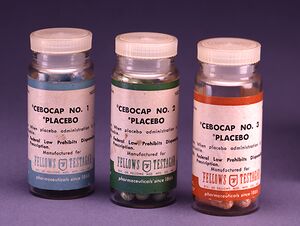Placebo Effect: Difference between revisions
No edit summary |
No edit summary |
||
| Line 10: | Line 10: | ||
Placebos have been in use since antiquity and may have been significant in improving health and quality of life when little was known about the etiology of most illnesses. The emergence of placebo-controlled clinical trials in the 1940s reintroduced the placebo effect to the modern day<ref>Munnangi S, Sundjaja JH, Singh K, Dua A, Angus LD. Placebo effect. Available: https://pubmed.ncbi.nlm.nih.gov/30020668/<nowiki/>(accessed 21.4.2022)</ref>. Over the past 30 years there has been an increase in research on the placebo effect using a neuroscientific approach, with an interest in the identification of several biological mechanisms of the placebo. An important contribution of neuroscience has been to highlight the important role of psychobiological factors in therapeutic outcomes, be they drug related or not<ref>Benedetti F, Frisaldi E, Shaibani A. Thirty years of neuroscientific investigation of placebo and nocebo: the interesting, the good, and the bad. Annual review of pharmacology and toxicology. 2022 Jan 6;62:323-40.Available:https://pubmed.ncbi.nlm.nih.gov/34460317/ (accessed 21.4.2022)</ref>. | Placebos have been in use since antiquity and may have been significant in improving health and quality of life when little was known about the etiology of most illnesses. The emergence of placebo-controlled clinical trials in the 1940s reintroduced the placebo effect to the modern day<ref>Munnangi S, Sundjaja JH, Singh K, Dua A, Angus LD. Placebo effect. Available: https://pubmed.ncbi.nlm.nih.gov/30020668/<nowiki/>(accessed 21.4.2022)</ref>. Over the past 30 years there has been an increase in research on the placebo effect using a neuroscientific approach, with an interest in the identification of several biological mechanisms of the placebo. An important contribution of neuroscience has been to highlight the important role of psychobiological factors in therapeutic outcomes, be they drug related or not<ref>Benedetti F, Frisaldi E, Shaibani A. Thirty years of neuroscientific investigation of placebo and nocebo: the interesting, the good, and the bad. Annual review of pharmacology and toxicology. 2022 Jan 6;62:323-40.Available:https://pubmed.ncbi.nlm.nih.gov/34460317/ (accessed 21.4.2022)</ref>. | ||
== | == Mechanism == | ||
Two theories have been proposed to explain the placebo effect: | |||
# Conditioning theory: that the placebo effect is a conditioned response | |||
# Mentalistic theory: sees the patient's expectation as the primary cause of the placebo effect. | |||
The mechanisms involved in these processes are beginning to be understood through new techniques of investigation in neuroscience. | |||
* [[Dopamine]] and the endorphins have been clearly shown to be mediators of placebo effects. | |||
* Brain imaging has demonstrated that placebos can mimic the effect of the active drugs and activate the same brain areas. | |||
This is the case for placebo-dopamine in Parkinson's disease, for placebo-analgesics or antidepressants, and for placebo-caffeine in the healthy subject. It remains to be understood how conditioning and expectation are able to activate memory loops in the brain that reproduce the expected biological responses<ref>Haour F. Mechanisms of the placebo effect and of conditioning. Neuroimmunomodulation. 2005;12(4):195-200. Available:https://pubmed.ncbi.nlm.nih.gov/15990450/ (accessed 21.4.2022)</ref>. | |||
== Sub Heading 3 == | == Sub Heading 3 == | ||
Revision as of 02:11, 21 April 2022
Original Editor - User Name
Top Contributors - Lucinda hampton, Uchechukwu Chukwuemeka, Melissa Coetsee, Kim Jackson and Kirenga Bamurange Liliane
Introduction[edit | edit source]
A placebo is a substance that has positive effects as a result of a patient's perception that it is beneficial rather than as a result of a causative ingredient. The Placebo effect is a phenomenon where, with the usage of certain substances, a “perceived” beneficial impact is created. A placebo can be eg a saline solution, sterile water or a sham surgery. It is not known to have any medical significance hence is considered as a “fake” treatment. Interestingly in some cases they tend to produce real responses. The expectations of the patient plays a large part here, with higher the belief in the treatment the greater chances of it being beneficial.[1]
Placebos have been in use since antiquity and may have been significant in improving health and quality of life when little was known about the etiology of most illnesses. The emergence of placebo-controlled clinical trials in the 1940s reintroduced the placebo effect to the modern day[2]. Over the past 30 years there has been an increase in research on the placebo effect using a neuroscientific approach, with an interest in the identification of several biological mechanisms of the placebo. An important contribution of neuroscience has been to highlight the important role of psychobiological factors in therapeutic outcomes, be they drug related or not[3].
Mechanism[edit | edit source]
Two theories have been proposed to explain the placebo effect:
- Conditioning theory: that the placebo effect is a conditioned response
- Mentalistic theory: sees the patient's expectation as the primary cause of the placebo effect.
The mechanisms involved in these processes are beginning to be understood through new techniques of investigation in neuroscience.
- Dopamine and the endorphins have been clearly shown to be mediators of placebo effects.
- Brain imaging has demonstrated that placebos can mimic the effect of the active drugs and activate the same brain areas.
This is the case for placebo-dopamine in Parkinson's disease, for placebo-analgesics or antidepressants, and for placebo-caffeine in the healthy subject. It remains to be understood how conditioning and expectation are able to activate memory loops in the brain that reproduce the expected biological responses[4].
Sub Heading 3[edit | edit source]
Resources[edit | edit source]
- bulleted list
- x
or
- numbered list
- x
References[edit | edit source]
- ↑ Byjus Placebo effect Available:https://byjus.com/biology/placebo-effect/ (accessed 21.4.2022)
- ↑ Munnangi S, Sundjaja JH, Singh K, Dua A, Angus LD. Placebo effect. Available: https://pubmed.ncbi.nlm.nih.gov/30020668/(accessed 21.4.2022)
- ↑ Benedetti F, Frisaldi E, Shaibani A. Thirty years of neuroscientific investigation of placebo and nocebo: the interesting, the good, and the bad. Annual review of pharmacology and toxicology. 2022 Jan 6;62:323-40.Available:https://pubmed.ncbi.nlm.nih.gov/34460317/ (accessed 21.4.2022)
- ↑ Haour F. Mechanisms of the placebo effect and of conditioning. Neuroimmunomodulation. 2005;12(4):195-200. Available:https://pubmed.ncbi.nlm.nih.gov/15990450/ (accessed 21.4.2022)







